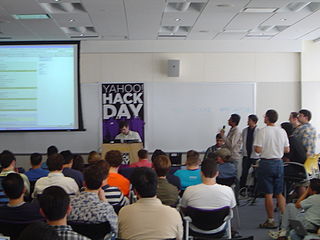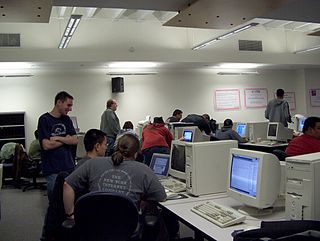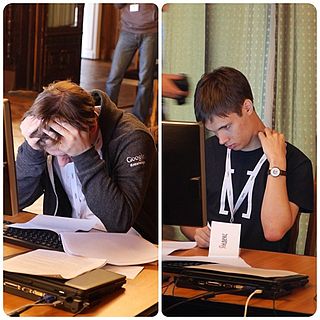Related Research Articles
A pseudonymous remailer or nym server, as opposed to an anonymous remailer, is an Internet software program designed to allow people to write pseudonymous messages on Usenet newsgroups and send pseudonymous email. Unlike purely anonymous remailers, it assigns its users a user name, and it keeps a database of instructions on how to return messages to the real user. These instructions usually involve the anonymous remailer network itself, thus protecting the true identity of the user.

Leonard Harris Sassaman was an American technologist, information privacy advocate, and the maintainer of the Mixmaster anonymous remailer code and operator of the randseed remailer. Much of his career gravitated towards cryptography and protocol development.

DEF CON is one of the world's largest and most notable hacker conventions, held annually in Las Vegas, Nevada. The first DEF CON took place in June 1993 and today many attendees at DEF CON include computer security professionals, journalists, lawyers, federal government employees, security researchers, students, and hackers with a general interest in software, computer architecture, hardware modification, conference badges, and anything else that can be "hacked". The event consists of several tracks of speakers about computer- and hacking-related subjects, as well as cyber-security challenges and competitions. Contests held during the event are extremely varied, and can range from creating the longest Wi-Fi connection (aircrack-ng) to finding the most effective way to cool a beer in the Nevada heat.

Bram Cohen is an American computer programmer, best known as the author of the peer-to-peer (P2P) BitTorrent protocol in 2001, as well as the first file sharing program to use the protocol, also known as BitTorrent. He is also the co-founder of CodeCon and organizer of the San Francisco Bay Area P2P-hackers meeting, was the co-author of Codeville and creator of the Chia cryptocurrency which implements the proof of space-time consensus algorithm.
Code review is a software quality assurance activity in which one or several people check a program mainly by viewing and reading parts of its source code, and they do so after implementation or as an interruption of implementation. At least one of the persons must not be the code's author. The persons performing the checking, excluding the author, are called "reviewers".

Cult of the Dead Cow, also known as cDc or cDc Communications, is a computer hacker and DIY media organization founded in 1984 in Lubbock, Texas. The group maintains a weblog on its site, also titled "Cult of the Dead Cow". New media are released first through the blog, which also features thoughts and opinions of the group's members.

A hackathon is a design sprint-like event; often, in which computer programmers and others involved in software development, including graphic designers, interface designers, project managers, domain experts, and others collaborate intensively on software projects.

Black Hat Briefings is a computer security conference that provides security consulting, training, and briefings to hackers, corporations, and government agencies around the world. Black Hat brings together a variety of people interested in information security ranging from non-technical individuals, executives, hackers, and security professionals. The conference takes place regularly in Las Vegas, Barcelona, London, Abu Dhabi. The conference has also been hosted in Amsterdam, Tokyo, and Washington, D.C. in the past.
A security hacker is someone who explores methods for breaching defenses and exploiting weaknesses in a computer system or network. Hackers may be motivated by a multitude of reasons, such as profit, protest, information gathering, challenge, recreation, or evaluation of a system weaknesses to assist in formulating defenses against potential hackers. The subculture that has evolved around hackers is often referred to as the "computer underground".
Bitfrost is the security design specification for the OLPC XO, a low cost laptop intended for children in developing countries and developed by the One Laptop Per Child (OLPC) project. Bitfrost's main architect is Ivan Krstić. The first public specification was made available in February 2007.

Jeff Moss, also known as Dark Tangent, is an American hacker, computer and internet security expert who founded the Black Hat and DEF CON computer security conferences.
Dr. Herbert Hugh Thompson is a computer security expert, an Adjunct Professor in the Computer Science Department at Columbia University, and the Chief Technology Officer of Symantec. He is also the Program Chairman of RSA Conference the world's largest information security conference with over 25,000 attendees annually. Thompson is the co-author of a book on human achievement titled The Plateau Effect: Getting from Stuck to Success published by Penguin in 2013 and has co-authored three books on information security including, How to Break Software Security: Effective Techniques for Security Testing published by Addison-Wesley, and The Software Vulnerability Guide published by Charles River 2005. He is perhaps best known for his role in exposing electronic voting machine vulnerabilities as part of the HBO Documentary Hacking Democracy. He was named one of the "Top 5 Most Influential Thinkers in IT Security" by SC Magazine and has been referred to by the Financial Times as "One of the world’s foremost cryptology and internet security experts."

Daniel Kaminsky was an American computer security researcher. He was a co-founder and chief scientist of WhiteOps, a computer security company. He previously worked for Cisco, Avaya, and IOActive, where he was the director of penetration testing. The New York Times labeled Kaminsky an "Internet security savior" and "a digital Paul Revere".

Meredith L. Patterson is an American technologist, science fiction writer, and journalist. She has spoken at numerous industry conferences on a wide range of topics. She is also a blogger and software developer, and a leading figure in the biopunk movement.

A Linux User Group or Linux Users' Group (LUG) or GNU/Linux User Group (GLUG) is a private, generally non-profit or not-for-profit organization that provides support and/or education for Linux users, particularly for inexperienced users. The term commonly refers to local groups that meet in person, but is also used to refer to online support groups that may have members spread over a very wide area and that do not organize, or are not dependent on, physical meetings. Many LUGs encompass FreeBSD and other free-software / open source Unix-based operating systems.
A computer security conference is a convention for individuals involved in computer security. They generally serve as meeting places for system and network administrators, hackers, and computer security experts.

Jeff Atwood (1970) is an American software developer, author, blogger, and entrepreneur. He writes the computer programming blog Coding Horror. He co-founded the computer programming question-and-answer website Stack Overflow and co-founded Stack Exchange, which extends Stack Overflow's question-and-answer model to subjects other than programming.
Pwn2Own is a computer hacking contest held annually at the CanSecWest security conference. First held in April 2007 in Vancouver, the contest is now held twice a year, most recently in April 2021. Contestants are challenged to exploit widely used software and mobile devices with previously unknown vulnerabilities. Winners of the contest receive the device that they exploited and a cash prize. The Pwn2Own contest serves to demonstrate the vulnerability of devices and software in widespread use while also providing a checkpoint on the progress made in security since the previous year.

Competitive programming is a mind sport usually held over the Internet or a local network, involving participants trying to program according to provided specifications. Contestants are referred to as sport programmers. Competitive programming is recognized and supported by several multinational software and Internet companies, such as Google and Facebook.
The concept of weird machine is a theoretical framework to understand the existence of exploits for security vulnerabilities. Exploits exist empirically, but were not studied from a theoretical perspective prior to the emergence of the framework of weird machines.
References
- ↑ "Information Security News - CodeCon 2009 Call for Presentations". Jan 2009.
- ↑ "Bram Cohen interview". 22 April 2009.
- ↑ Knight, Will (2002-02-19). "Peekabooty aims to banish internet censorship". New Scientist.
- ↑ "CodeCon to trailblaze emerging tech". 2003-01-24.
- ↑ "CodeCon - 2002". Archived from the original on 2004-02-16.
- ↑ "Story". www.infoanarchy.org. 20 Feb 2002. Archived from the original on 2004-02-01.
- ↑ L. Koontz (13 Feb 2003). "It's Time for CodeCon 2.0". LinuxJournal.com.
- ↑ Slutsky, Irina (11 December 2008). "Len Sassaman & Meredith Patterson are CodeCon Valentines". YouTube. GeekEntertainment.TV. Archived from the original on 2021-12-12.
- ↑ "Bloomberg Builds New Coding Contest Platform". 2015-02-04.
- ↑ "'Star Trek' universal translator becomes reality in new Skype feature". 2014-05-28.